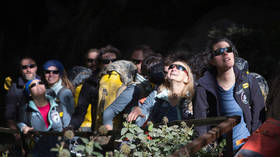‘It was like pressing pause’: Group of 15 volunteers emerges from 40-day isolation experiment in a cave

A group of 15 French volunteers left a cave on Saturday after a gruelling 40-day stint without any sense of time, in an experiment to test human adaptability to isolation.
The group, led by French-Swiss explorer Christian Clot, ended the so-called “Deep Time” experiment at 10:30 am (0830 GMT) and emerged from the Lombrives cave in Ariege, southwest France.
The participants were aged between 27 and 50 and lived for 40 days with no watches, no cell phones, and no natural light to help them tell what time it was. The team simply counted their ‘days’ in sleep cycles and listened only to their biological clocks to estimate the flow of time.
Au-delà de la compréhension des mécanismes adaptatifs individuels et de groupe, il est essentiel de comprendre le milieu dans lequel on évolue. En partenariat avec @GeoSLAMLtd et Tomas Blaha, nous avons lancé une opération unique de cartographie en 3D de la grotte de @Lombrives. pic.twitter.com/k0CT0c9yEL
— ADAPTATION (@HumanAdaptation) April 15, 2021
They lived underground in a cave system with a constant temperature of 12 Celsius (54 Fahrenheit) and roughly 95% humidity, generating their own electricity with a pedal bike and extracting their drinking water from a well 45 meters below the cave floor.
Dans la série "Underground Life", nous vous présentons "Underground cooking", dans la Grotte de Lombrives. #deeptime#deeptime40#sciencepic.twitter.com/Vmhr9ZbWOo
— ADAPTATION (@HumanAdaptation) April 21, 2021
Clot, founder of the Human Adaptation Institute, said the 1.2 million-euro ($1.5 million) “Deep Time” project was designed to test the human ability to adapt to the loss of their frame of reference for time and space.
Participants’ brain activity and cognitive function data were gathered before and after the experiment as scientists monitored the 15 members’ sleep patterns, social interactions and behavioral reactions via sensors throughout the experiment.
🇫🇷 Cette semaine, nous vous apportons des remontées de la Grotte de Lombrives, avec la série « Underground life ». Aujourd'hui : Prélèvement de sang dans la grotteenglish version below ⬇️ pic.twitter.com/pOKhBZJY99
— ADAPTATION (@HumanAdaptation) April 8, 2021
The volunteers were given no updates on the pandemic and had no communications with friends or family.
“It was like pressing pause,” said 33-year-old Marina Lançon, one of seven female members in the experiment, who noted the absence of a rush to complete tasks.
Surprisingly, she actually wished she could remain in the cave for a few days longer and claimed she would wait a few days before turning her smartphone on again so as to avoid a “brutal” return to normality.
Also on rt.com The power within: Scientists develop method to enhance body’s own painkillers in major breakthroughIn fact, some two-thirds of the group wished to remain a bit longer in order to finish projects they had started at the beginning of the expedition. One team member estimated the time underground at just 23 days while another ran 10-kilometer circles in the cave to stave off boredom and to stay on, while fighting what they described as “visceral urges” at times to flee the cave.
Clot said that, for most of the participants, “in our heads, we had walked into the cave 30 days ago.”
ILS ONT VÉCU 40 JOURS SOUS TERRE !@ChristianClot et son équipe sont sortis ce samedi de la Grotte de Lombrives, où ils ont vécu 40 jours sans indication temporelle. pic.twitter.com/ThCGszXZE3
— ADAPTATION (@HumanAdaptation) April 25, 2021
Think your friends would be interested? Share this story!














